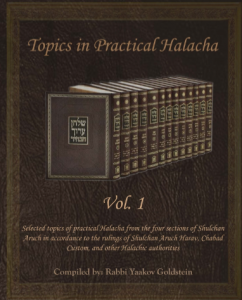This article is an excerpt from our Sefer
Buy here or on Amazon.com
Not to delay one’s bathroom needs:[1]
The prohibition:[2] One who withholds his bowels or bladder transgresses the [Rabbinical[3]] command of “Al Tishaktzu Es Nafshoseichem[4]”.
Does the prohibition apply to withholding urine? However, there are opinions[5] who rule the prohibition of “Bal Tishaktzu” does not apply to one who withholds urine. Nevertheless, even in their opinion, it is [Rabbinically[6]] forbidden to withhold urine due to danger and due to that it can cause one to become sterile.[7]
Withholding an urge to flatulate:[8] It is permitted to withhold the urge to flatulate as doing so does not consist of Bal Tishaktzu.
At what point is one obligated to relieve his urge to urinate or defecate? Coming up in Part 2!
Withholding one’s bowels or urine in order to find a private area: Coming up in Part 2!
One who feels the urge to use the bathroom in middle of Davening: Coming up in Part 3!
|
Sparks of Kabala Expelling the evil Kelipos:[9] When one eats food his body refines the nutrients from the waste. The nutrients are absorbed by the cells while the waste is discarded below and becomes impure Kelipos. One who delays his needs is in essence delaying the removal of these evil Kelipos from his body and is thus defiling his soul even more than his body. It is for this reason the verse emphasizes “Do not defile your soul”. Prior to using the bathroom one is to have this intent, that he is doing so in order to rid himself of this Kelipa.
A Segula for purity of mind and health:[10] The Kabalists state that one who is lax in these laws abstains himself from purity of mind. One who is meticulous and desires to attach himself to his creator needs to beware that his body be clean at all times. This helps one become also physically healthy and turns one into a new body. |
___________________________________________________________________________
[1] Basra 3:11; Kama 3:24; Michaber 3:17; Gemara Makos 16b
Siddur Seder Netilah: “One who holds in his needs transgresses the Rabbinical command of “Do not disgust yourselves”, unless he is holding himself in order to find a private area to release himself, as the sages did not implement their words in a situation that it degrades one’s honor. Similarly, if he is in the midst of prayer, after Baruch Sheamar, he should not stop to relieve himself if he can hold it in until after prayer. There are opinions who say that by urine, the prohibition of “Do not disgust yourselves” does not apply. However, even according to their opinion, this is still prohibited being that it is dangerous, and can bring a person to become sterile. Some say that only if one cannot hold himself in for a parsa’s distance does the prohibition of “Do not disgust yourself” and of danger (by urine) apply.”
[2] Basra ibid; Siddur ibid; Kama ibid; Michaber ibid; Rav Achaiy in Makos ibid “One who delays his bowels transgresses Bal Tishaktzu”
[3] Basra ibid and Siddur; omitted in Kama; Peri Megadim 3 M”Z 13; Kaf Hachaim 3:47; See Siddur of Rav Raskin footnote 88; Shaareiy Teshuvah 3; Sdei Chemed Asifus Dinim; Minchas Chinuch 163; Ksav Sofer 88; Miaseif Lechol Hamachanos 3:43
The reason: This opinion learns that the verse [Vayikra 11:43] of “Al Tishaktzu” is mainly referring to the prohibition against eating insects, as discussed in Parshas Shemini, and hence the usage of this verse to teach us that one may not withhold his bowels is merely a Rabbincial scriptural leaning, called an Asmachta.
Other Opinions: Some Poskim rule that one who holds in urine or bowel movement transgresses a Biblical command of “Baal Teshaktzu”. By urine one transgresses an additional Biblical command of “Al Tiyeh Akar”. [Sefer Chareidim 32:56]
[4] In English: “Do not perform repulsive acts to your soul”. This term became known in Hebrew as “Bal Tishaktzu” [see Kama, Basra and Siddur which use this term.]
[5] Opinion in Basra ibid and Siddur ibid, omitted in Kama; Rashba [See Siddur of Rav Raskin footnote 96]; Implied from M”A 92:1, brought in Elya Raba 92:2
Ruling in Kama: In Kama ibid Admur rules that by urine both the prohibition of danger and of “Al Tishaktzu” apply. He does not mention any dissenting opinion.
[6] So is implied from wording of Basra and Siddur, however, see above from Chareidim that it is a Biblical prohibition.
[7] Basra ibid and Siddur
[8] Siddur; Admur 103:2; Elya Raba 3:16; Peri Megadim 3 M”Z 13; Shaareiy Teshuvah 3:16; Kitzur SH”A 4; Kaf Hachaim 3:47; M”B 103:3
[9] Arizal in Shaar Hamitzvos Shemini, brought in Ben Ish Chaiy Vayeitzei; Kaf Hachaim 3:46
[10] Chesed Leavraham brought in Ben Ish Chaiy Vayeitzei 1 and Kaf Hachaim ibid



Leave A Comment?
You must be logged in to post a comment.